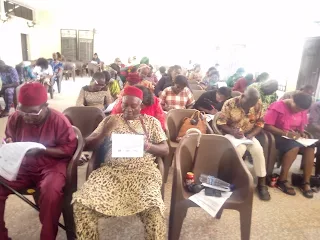By Okechukwu Onuegbu
The Strengthen Public Accountability for Results and Knowledge (SPARK II) project, a nongovernmental organisation supported by International Budget Partnership (IBP), has trained the Ward Development Committees (WDCs) and Officers in Charge (OICs) in Anambra State for improved healthcare services delivery to the vulnerable, women and children.
The two days programme held at Abagana, Njikoka Local Government Area (LGA), Anambra State, was organised by SPARK II supported by IBP and implemented in collaborations with Community Empowerment Network (COMEN), the Civil Rights Concern (CRC) and Justice Development and Peace Caritas (JDPC) Nnewi Diocese with the collaboration of Anambra State Primary Healthcare Development Agency (ASPHCDA).
Speaking at the occasion, the Executive Secretary/Chief Executive Officer, ASPHCDA, Pharmacist Chisom Uchem, urged stakeholders to collaborate with health practitioners at Primary Healthcare Centres (PHCs) towards ensuring that vulnerable groups, children and women gain improved access to healthcare services at the grassroots.
Uchem, who identified WDCs and OICs as key stakeholders in primary healthcare services delivery, argued that effective collaborations would help to rebuild trust and encourage the vulnerable, children and mothers to participate in immunisation and other health programmes.
Contributing, the Director, JDPC Nnewi, Rev. Fr. Ben Okolo, argued that Anambra State has the potential to become a model for other States in Nigeria by demonstrating effective collaboration, capacity building and community ownership of healthcare delivery.
"A system is only as strong as the people who protect it, and today's session is designed to equip you with the knowledge, tools, and strategies needed to navigate complex public finance management issues. These include budget tracking, proper fund retirement, and ensuring that healthcare services are delivered efficiently and equitably," he added.
Also speaking, the JDPC Nnewi SPARK Program Manager, Mr Onyekachi Ololo, posited that the capacity building was part of the overall strategic approach to achieving a systemic shift in Primary Healthcare service delivery.
This according to him, was because beyond the improvement of relationships between the OICs with their WDCs, they would be well equipped with the right information, knowledge, and skills to provide adequate health care services at the primary healthcare centers for better healthcare outcomes.
"Maternal and Child Healthcare is the entry point for the SPARK II project, hence efforts must be put together by all stakeholders to ensure the PHCs serve this category of people wearing the gender and Intersectionality lenses. The training will serve as a refresher course for the old OICs and WDCs, and provide the requisite knowledge for the new OICs and the WDCs recently constituted by the State Government Ministry of Health," he noted.
On her part, the IBP COMEN Consultant, Ugochi Ehiahuruike, explained that objective of the training was to strengthen the OICs capacity in developing business plans tailored to the needs of the PHCs for timely and transparent financial retirement, and improved maternal and child care.
"Let's pay adequate attentions to our facilities while facilitating sessions on current status, challenges and solution in maternal healthcare delivery delivery and roles and responsibilities of WDCs at facility, LG and agency levels and presentation on overview of PHCs definition, principles, importance, work plans development and retirement of BHCPH," she re-emphasised.
Speaking in separate interviews, the Director, Community Healthcare, Awka South LGA, Dr Okeke Ngozi, and Chief Godwin Eze of Community Empowerment Network, expressed confidence that the programme would help WDCs and OICs to support the government in achieving it various health programmes at the grassroots for health and wellbeing of all.




